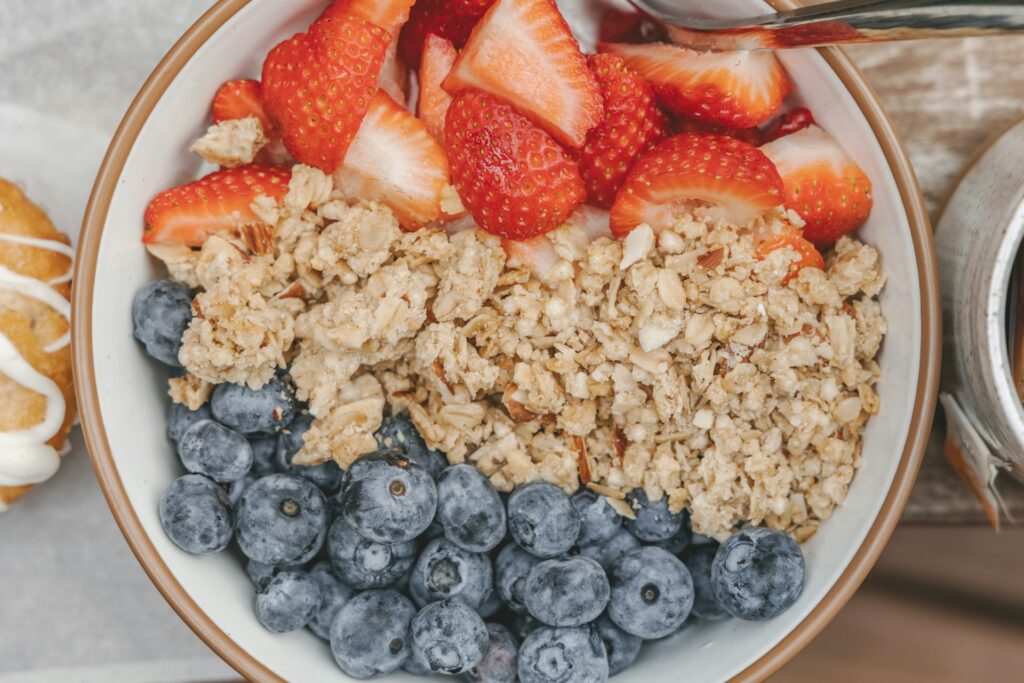Heart disease is a leading cause of death worldwide. The good news? Diet plays a crucial role in maintaining cardiovascular health.
Functional foods offer health benefits beyond basic nutrition, such as lowering cholesterol, reducing inflammation, and improving blood vessel function. Here are some of the best functional foods for heart health.
1. Fatty Fish: A Functional Food for Heart Health

Fatty fish like salmon, mackerel, and sardines provide omega-3 fatty acids, which reduce triglycerides, lower blood pressure, and decrease the risk of heart arrhythmias.
The American Heart Association recommends eating at least two servings of fatty fish per week to support heart health.
Plant-Based Sources of Omega-3s for Heart Health
Eat vegan or vegetarian? Flaxseeds, chia seeds, walnuts, hemp seeds, and algae-based supplements offer excellent omega-3 sources.
These options provide alpha-linolenic acid (ALA), which the body converts into EPA and DHA. Algae-based omega-3 supplements serve as a direct source of DHA and EPA, making them a great fish alternative.
2. Oats and Whole Grains: Heart-Healthy Functional Foods

Oats contain beta-glucan, a soluble fiber that lowers LDL (bad) cholesterol. Whole grains like quinoa, barley, and brown rice provide fiber, antioxidants, and plant sterols that enhance cardiovascular wellness.
Research links whole grain-rich diets to a lower risk of heart disease. As a private practice dietitian, I always recommend buying organic oats to my clients, when possible.
3. Nuts and Seeds: Functional Foods for a Strong Heart

Almonds, walnuts, flaxseeds, and chia seeds deliver heart-healthy fats, fiber, and plant-based omega-3s. Studies show that regular nut consumption lowers cholesterol and reduces inflammation.
4. Leafy Greens: Functional Foods that Support Heart Health

Spinach, kale, and Swiss chard provide vitamins, minerals, and nitrates that regulate blood pressure and improve artery function. Diets high in leafy greens link to a lower risk of cardiovascular disease.
5. Berries: Antioxidant-Packed Functional Foods for Heart Health

Blueberries, strawberries, and raspberries contain antioxidants and polyphenols, reducing oxidative stress and inflammation. Eating at least three servings of berries per week lowers heart attack risk..
Research suggest consuming 1 cup of blueberries daily may help lower cardiovascular disease risk by 12-15%, making them a valuable addition to a heart healthy diet.
Try this delicious Blueberry Hempseed Salad which combines three heart-healthy ingredients to provide plant-based protein, omega-3s, fiber, and antioxidants.
6. Dark Chocolate: A Sweet Functional Food for Heart Health

Dark chocolate (at least 70% cocoa) provides flavanols, which support blood vessel function and lower blood pressure. Moderate consumption reduces heart disease risk.
7. Legumes: Plant-Based Functional Foods for a Healthy Heart

Beans, lentils, and chickpeas supply fiber, plant-based protein, and antioxidants that support heart health. Studies indicate eating legumes four times per week reduces LDL cholesterol and heart disease risk.
For easier digestion and nutrient absorption, always soak dry beans before cooking, choose canned varieties, or opt for sprouted beans.
Looking for ways to add more beans, lentils, or chickpeas to your diet, try these delicious, quick and easy recipes:
5-Ingredient Vegan Lentil Bolognese
8. Olive Oil: A Functional Food for Heart-Healthy Cooking

Olive oil, particularly extra-virgin, contains beneficial nutrients like monounsaturated fats (MUFAs), polyphenols, and vitamin E, which support heart health.
Its anti-inflammatory and antioxidant properties help improve cholesterol levels, blood pressure, and blood sugar control.
Additionally, olive oil positively influences gut microbiota, contributing to a lower risk of cardiovascular diseases and overall mortality.
Research suggests that regular consumption of olive oil and its key components can reduce the likelihood of heart-related issues and improve long-term health outcomes.
Keep in Mind: Food is Medicine.
Adding functional foods to your diet enhances heart health and reduces cardiovascular disease risk. However, like medicine, functional foods work most effectively when consumed regularly.
A diverse diet rich in nutrient-dense foods ensures that your body receives a wide range of essential vitamins, minerals, and bioactive compounds needed for optimal health.
Start by incorporating omega-3-rich fish, fiber-packed whole grains, antioxidant-rich berries, and heart-friendly fats like nuts and olive oil into your daily routine.
By maintaining consistency and variety in your diet, you can maximize the benefits of functional foods and support long-term cardiovascular well-being.
Ready to Improve Your Heart Health?
At Core Nutrition Health and Wellness, our registered dietitians work with you to create a heart-healthy meal plan tailored to your food preferences and lifestyle, helping to improve not only your heart health but also your overall well-being.. Book a consultation today and let insurance cover the cost.

